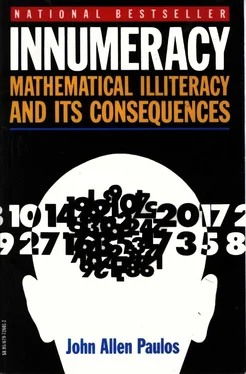Imagine that 10,000 tests for cancer are administered. Of these, how many are positive? On the average, 50 of these 10,000 people (.5 percent of 10,000) will have cancer, and so, since 98 percent of them will test positive, we will have 49 positive tests. Of the 9,950 cancerless people, 2 percent of them will test positive, for a total of 199 positive tests (.02 x 9,950 = 199). Thus, of the total of 248 positive tests (199 + 49 = 248), most (199) are false positives, and so the conditional probability of having cancer given that one tests positive is only 49/248, or about 20 percent! (This relatively low percentage is to be contrasted with the conditional probability that one tests positive, given that one has cancer, which by assumption is 98 percent.)
This unexpected figure for a test that we assumed to be 98 percent accurate should give legislators pause when they contemplate instituting mandatory or widespread testing for drugs or AIDS or whatever. Many tests are less reliable: a recent article in The Wall Street Journal, for example, suggests that the well-known Pap test for cervical cancer is only 75 percent accurate. Lie-detection tests are notoriously inaccurate, and calculations similar to the above demonstrate why truthful people who flunk polygraph tests usually outnumber liars. To subject people who test positive to stigmas, especially when most of them may be false positives, is counterproductive and wrong.
Less worrisome than inaccurate tests is numerology, the last pseudoscience I want to discuss, and my favorite. It is a very old practice common to a number of ancient and medieval societies and involves the assignment of numerical values to letters and the consequent reading of significance into the numerical equality between various words and phrases.
The numerical values of the letters in the Hebrew word for "love" (ahavah) add up to 13, the same total as the letters in the word for "one" (ehad ). Since "one" is short for "one God," the equality of the two words was deemed significant by many, as was the fact that their sum is 26, the numerical equivalent of "Yahweh," the divine name of God.
The number 26 was important for other reasons: in verse 26 of the first chapter of Genesis, God says: "Let us make man in our image"; Adam and Moses were separated by 26 generations; and the difference between the numerical equivalent of Adam (45) and that of Eve (19) is 26.
The rabbis and cabalists who engaged in numerology (gematria) used a variety of other systems as well, sometimes disregarding powers of 10-taking 10 to be 1, 20 to be 2, and so on. Thus, since the first letter of "Yahweh" was assigned a value of 10, it could, when the occasion demanded, be assigned a value of 1, making "Yahweh" equal in value to 17, the same as the numerical equivalent of the word for "good" (tov). At other times they considered the squares of the numerical values of the letters, in which case "Yahweh" would equal 186, the same as the word for "place" (Maqom), another way of referring to God.
The Greeks, too, engaged in numerological practice (isopsephia), both in antiquity, with the number mysticism of Pythagoras and his school, and especially later, with the introduction of Christianity. In this system the Greek word for "God" (Theos) had a numerical value of 284, as did the words for "holy" and "good." The numerical value of the letters alpha and omega, the beginning and the end, was 801, the same as the word for "dove" (peristera), and was supposed to be a mystical corroboration of the Christian belief in a Trinity. The Greek Gnostics noted that the Greek word for " Nile River " had a numerical value of 365, indicating the annual nature of its floods.
Christian mystics devoted much energy to deciphering the number 666, said by John the Apostle to designate the name of the Beast of the Apocalypse, the Antichrist. The method used to assign numbers to letters was not specified, however, and so it's not entirely clear to whom the number refers. "Caesar Nero," the name of the first Roman Emperor to persecute the Christians, had a value of 666 in the Hebrew system, as did the word for "Latins" in the Greek system. The number has often been used in the service of ideology: a Catholic writer of the sixteenth century wrote a book whose gist was that Martin Luther was the Antichrist, since in the Latin system his name had a value of 666. Soon enough, some of Luther's followers responded that the words in the papal crown, "Vicar of the Son of God," had the value 666 if one added the Roman numerals corresponding to letters appearing in the phrase. More recently, the extreme fundamentalist right has noted that each word in the name Ronald Wilson Reagan has six letters.
Similar examples could be given of Moslem numerological practices. Such numerical readings (Jewish, Greek, Christian, and Moslem) were used not just to provide mystical confirmation of religious doctrine but also in soothsaying, dream interpretation, divination by numbers, etc. Often, they were opposed by orthodox clergy, but were very popular among the laity.
Even today, some of these numerological superstitions are not dead. I wrote a review for The New York Times of Georges Ifrah's From One to Zero (from which most of the above is taken) and referred in a completely neutral manner to the number 666, Martin Luther, and the papal crown. In response I received a half dozen deranged, anti-Semitic letters, some calling me the Antichrist. Procter and Gamble had similar but more severe problems a few years ago with reference to the numerico-symbolic nature of its logo.
Numerology, especially in its soothsaying and divinatory aspects, is in many ways a typical pseudoscience. It makes predictions and claims that are almost impossible to falsify since an alternative formulation consistent with what happened is always easy to dream up. Based on number, it has a limitless complexity to engage the ingenuity and creativity of its adherents, without burdening them with the need for validation or testing. Its expressions of equality are generally used to corroborate some existing doctrine, and little if any effort is expended to construct counter-examples. Surely, "God" must be numerically equivalent to phrases which deny doctrine, or to words which are sacrilegious or funny. (I'll forgo giving my examples.) Like many other pseudosciences, numerology is ancient, and acquires some respectability from its religious associations.
Still, if one subtracts all the superstitious elements from the subject, there's something appealing about the small residue that remains. Its purity (just numbers and letters) and tabula-rasa quality (like a Rorschach test) allow one maximum scope for seeing what one wants to see, for connecting what one wants to connect, for providing at the very least a limitless source of mnemonic devices.
Since numbers and logic are inextricably intertwined both theoretically and in the popular mind, it's perhaps not stretching matters too far to describe faulty logic as a kind of innumeracy. This assumption has in fact been implicit throughout much of this chapter. Let me end, then, with a couple of additional bad inferences which are further suggestive of the role that innumeracy-in the guise of fallacious logic-plays in pseudoscience.
Confusing a conditional statement-if A, then B-with its converse-if B, then A-is a very common mistake. A slightly unusual version of it occurs when people reason that if X cures Y, then lack of X must cause Y. If the drug dopamine, e.g., brings about a decrease in the tremors of Parkinson's disease, then lack of dopamine must cause tremors. If some other drug relieves the symptoms of schizophrenia, then an excess of it must cause schizophrenia. One is not as likely to make this mistake when the situation is more familiar. Not too many people believe that since aspirin cures headaches, lack of aspirin in the bloodstream must cause them.
Читать дальше












